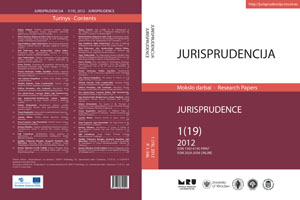Juridinis asmuo Lietuvos baudžiamojoje justicijoje
The Legal Person in the Criminal Justice of Lituania
Author(s): Agnė Baranskaitė, Jonas PrapiestisSubject(s): Law, Constitution, Jurisprudence
Published by: Mykolas Romeris University
Keywords: criminal law; the Supreme Court of Lithuania; criminal liability of a legal person; grounds for criminal liability; cassation jurisprudence; criminal cases; criminal lawmaking; constitutional jurisprudence in criminal law
Summary/Abstract: The article deals with the entrenchment of the institute of criminal liability of a legal person in the Lithuanian criminal law. Upon approval of the Criminal Code of the Republic of Lithuania (hereinafter also referred to as the CC) on 26 September 2000, the criminal liability of a legal person was provided almost in every fifth (at present—in every second) article of the Special Part of the CC. Although criminal liability has been increasingly applied to legal persons (e.g., in 2011, if compared to 2005, almost three times as much punishments were imposed), however, almost 90 percent of the articles of the CC providing also for criminal liability of a legal person are “dead”. One doubt arises with regard to social legitimacy of such lawmaking and the quality thereof in the sense of juridical technique. The article points out that essentially erroneous provisions are being established in the practice of institutions of pre-trial investigation and prosecutor’s office, and in the caselaw of the courts of first and appeal instances when the grounds of a legal person’s criminal liability are interpreted and applied, which are provided for in Article 20(2) of the CC, e.g., the formulation of suspicions and charges regarding criminal, selfish deeds of the head of a legal person or regarding criminal, selfish deeds of a similar person, committed by making use of the legal person, are essentially transferred, mechanically, also to such a legal person. Consequently, the legal person is quite often punished without prior elucidation of a particular manifestation of its guilt (contents thereof), the link of the legal person (more precisely, the owner (shareholder) of the legal person or the main shareholders of the legal person having the right of decisive vote, or the general meeting of shareholders, the board of the legal person or other governance structure thereof) with the criminal deed committed by the culprit—a natural person—for the benefit or in the interests of that legal person. Such a link may be two-way and may be characterised not necessarily by the fact that the culprit—a natural person—is holding a governing office in the legal person and enjoys respective powers. Having recognised that the criminal deed was committed by the culprit—a natural person—in order to gain property benefit or in other interests of the legal person, alongside, one must establish whether the legal person was aware of such criminal deed committed or prepared by the culprit—a natural person, whether the legal person comprehended, tolerated or induced such a deed, or whether it created preconditions for commission of such criminal deed. Without establishing that, such a situation is to be assessed as the one where the culprit—a natural person—while committing the criminal deed, was acting independently and arbitrarily, whereas, in such a case, bringing the legal person to criminal liability would mean objective imputation, i.e. the legal...
Journal: Jurisprudencija
- Issue Year: 19/2012
- Issue No: 1
- Page Range: 293-314
- Page Count: 22
- Language: German

